Fulbright: So much more than football, fun and free food
September 20, 2012
By Zeynep Alraqeb, guest columnist
In 1492, Christopher Columbus discovered America. In 2012, a group of German students discovered the United States of America. Discover, exchange and hopefully promote the better understanding between all nations: That was J. William Fulbright’s aim, who saw that “in the long course of history, having people who understand your thought is much greater security than another submarine.”
Fulbright’s International Exchange Program gives scholarships to students and helps to promote a good relationship between the United States and other countries. It is an academic and cultural exchange. An exchange between countries, but also between individuals.
For five years the University of Kentucky and the Fulbright Program offer students from Germany a great opportunity to experience this unique exchange on their own. Participants of the program “Discover the USA” have five weeks to get to know America in reality, not just from books, movies or the Internet. And at the same time, Americans have the chance to see how Germans are, to see how people from Bulgaria, Turkey, Russia, Uzbekistan, Syria and plenty other countries are. Because the additional specialty of this program is diversity — diversity that is usually typical for America. Everyone has a different origin. No one has just a German background.
And this is one of the discoveries that the student made. Despite all the different ancestors some American students had, they could just say “I am American.” An incredible fact.
Usually, in Germany, no matter if you were born there and never lived in the home country of your parents, they would consider you a non-German.
“Here I can say I am German without getting a strange look due to the fact that my outward appearance is unlike,” says Jin Jeong, whose parents are from South Korea.
The weeks at the UK passed quickly and the students can look back at many, many other experiences, observations and astonishments.
Starting with K-Week, they got overloaded with free T-shirts, free food and events, like the water balloon fight or Fusion Day. They learned more about sororities and fraternities. They attended classes. Learned to deal with a “point clicker” or “plus card.” They talked to Americans, went out with them and during the football game, they cheered on the team. Outside the campus they made trips to Louisville, Cincinnati, Natural Bridge and, of course, to a horse farm.
Now, flying back to Germany, the suitcase is full of presents (and free stuff), but also full of stories to share — full of feelings, thoughts and memories — but, hopefully, also full of a deep passion to bring other countries more together.






























































































































































